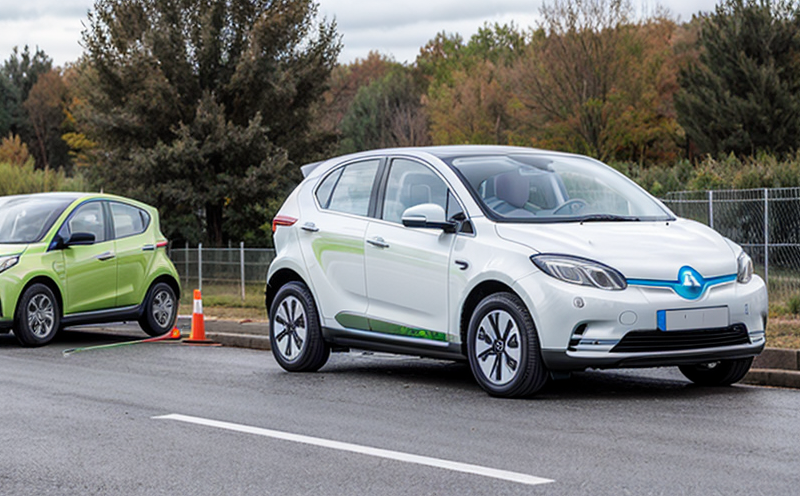UNE EN 62660-2 EV Lithium-Ion Cell Testing
The European standard UNE EN 62660-2 is a crucial document for the quality assurance and safety compliance of electric vehicle (EV) lithium-ion cells. This testing protocol ensures that batteries used in e-mobility applications meet stringent performance, safety, and durability requirements set forth by international standards.
The scope of this test includes evaluating the structural integrity, thermal stability, mechanical strength, and electrical characteristics of EV lithium-ion cells under a range of conditions simulating real-world usage scenarios. This ensures that manufacturers can reliably predict battery behavior in various environments, enhancing product safety and reliability.
UNE EN 62660-2 is particularly important for the automotive sector where the safety and performance of batteries are paramount. The standard covers a variety of tests such as:
- Battery cell integrity testing
- Thermal runaway prevention assessment
- Electrical impedance measurement for battery health monitoring
- Mechanical stress testing to evaluate durability in transport conditions
The testing process involves rigorous procedures that ensure the reliability and safety of EV batteries. Specimen preparation is critical, requiring precise handling and careful assembly to simulate real-world conditions accurately.
For quality managers and compliance officers, understanding these standards ensures that their products meet regulatory requirements and industry best practices. This knowledge also helps in managing procurement processes by selecting suppliers who adhere to such stringent testing protocols.
Why It Matters
The importance of UNE EN 62660-2 cannot be overstated, especially as the demand for electric vehicles continues to grow. Safety is a primary concern in the automotive industry, and this standard plays a vital role in ensuring that lithium-ion cells used in EVs are safe and reliable.
UNE EN 62660-2 addresses critical aspects such as:
- Preventing thermal runaway
- Ensuring long-term durability under various conditions
- Providing accurate electrical impedance measurements
- Evaluating structural integrity against mechanical stress
The standard also emphasizes the importance of consistent testing across different environmental conditions, which is crucial for EV battery performance in diverse climates.
By adhering to UNE EN 62660-2, manufacturers can enhance trust in their products and comply with international regulatory frameworks. This not only protects consumer safety but also fosters market confidence and growth in the e-mobility sector.
Applied Standards
| Standard Number | Description | Purpose |
|---|---|---|
| UNE EN 62660-1 | Battery characteristics for electric vehicles (EVs) | Sets out general requirements and definitions |
| UNE EN 62660-2 | Specific test methods for EV lithium-ion cells | Evaluates structural integrity, thermal stability, electrical characteristics, and more |
| ISO/IEC 17025 | Laboratory accreditation requirements | Ensures that testing facilities meet international standards of competence |
The above table highlights the key standards used in the UNE EN 62660-2 EV Lithium-Ion Cell Testing. These standards ensure that all tests are conducted under controlled and consistent conditions, providing reliable data for decision-making.
Eurolab Advantages
At Eurolab, we pride ourselves on offering comprehensive testing services that go above and beyond industry standards. Our UNE EN 62660-2 EV Lithium-Ion Cell Testing service provides several key advantages:
- Expertise: Our team of experienced engineers and technicians is well-versed in the latest testing methodologies.
- Accreditation: We are ISO/IEC 17025 accredited, ensuring that our services meet the highest international standards.
- Custom Solutions: We tailor our testing protocols to specific client needs and regulatory requirements.
- Prompt Reporting: Our clients receive detailed reports within days of completion, allowing for timely decision-making.
By choosing Eurolab for your UNE EN 62660-2 EV Lithium-Ion Cell Testing needs, you can be confident that your products will meet the highest standards of safety and reliability. Our commitment to excellence ensures that you are well-prepared for market entry in the e-mobility sector.





